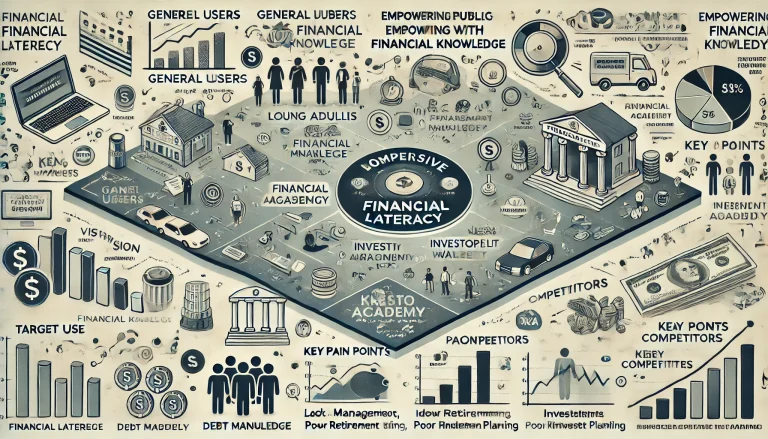Problem Statement
The financial services sector, particularly within the rapidly growing fintech industry, faces significant challenges in attracting and retaining top talent. As technology continues to revolutionize the sector, the demand for skilled professionals in critical areas such as artificial intelligence (AI), cybersecurity, and blockchain far exceeds the available supply. This imbalance creates fierce competition among firms, making it increasingly difficult to attract the talent necessary to drive innovation and maintain a competitive edge.
The challenge is exacerbated by the fast-paced and high-pressure environment that characterizes the fintech industry. Employees in this sector often face intense workloads, tight deadlines, and the constant need to stay ahead of technological advancements. As a result, retaining top talent is equally challenging. Skilled professionals may be lured away by competitors or startups offering more attractive opportunities, such as higher salaries, equity stakes, or more flexible work environments.
In particular, roles that require expertise in emerging technologies like AI, machine learning, cybersecurity, and blockchain are in exceptionally high demand. These roles are crucial for fintech companies to develop innovative products, enhance security measures, and maintain compliance with evolving regulations. However, the scarcity of qualified professionals means that firms must offer increasingly competitive compensation packages and benefits to attract these individuals.
Moreover, the fintech industry’s dynamic nature often leads to high employee turnover. Professionals in this field are constantly being presented with new opportunities, both within established firms and in startups that promise faster career growth and the chance to work on cutting-edge projects. This mobility can lead to significant challenges for fintech companies, as the loss of key personnel can disrupt ongoing projects, weaken institutional knowledge, and necessitate costly and time-consuming recruitment efforts.
To address these challenges, fintech companies must develop robust talent acquisition and retention strategies. This includes offering competitive compensation and benefits, creating a positive and inclusive work culture, and providing opportunities for continuous learning and professional development. Companies should also consider offering flexible work arrangements, such as remote work options and flexible hours, to appeal to a broader range of candidates.
Additionally, fostering a strong employer brand is essential. Fintech companies that are known for their innovation, commitment to employee well-being, and opportunities for growth will be better positioned to attract and retain top talent. By investing in employee engagement and satisfaction, firms can build a loyal and motivated workforce that is less likely to be swayed by external offers.
Ultimately, the ability to attract and retain top talent will be a key determinant of success in the fintech industry. Companies that can navigate these challenges effectively will be better equipped to drive innovation, achieve sustainable growth, and maintain a competitive advantage in an increasingly crowded market.
Pain Points
- Talent Shortage: The demand for skilled professionals in areas like AI, cybersecurity, and blockchain exceeds the available supply.
- Fierce Competition: Intense competition among fintech firms and startups for top talent, leading to bidding wars and inflated compensation packages.
- High Employee Turnover: The fast-paced, high-pressure environment in fintech contributes to high turnover rates, with employees frequently moving to competitors or startups.
- Retention Challenges: Retaining skilled professionals in a dynamic and competitive industry is difficult, as employees may be attracted to better opportunities elsewhere.
- Compensation and Benefits: Offering competitive compensation and benefits is essential to attract and retain top talent, but it can be costly and unsustainable in the long term.
- Work Culture and Environment: Creating a positive and inclusive work culture that fosters employee satisfaction and engagement is crucial for retention.
- Learning and Development: Providing continuous learning and professional development opportunities is necessary to keep employees motivated and up-to-date with the latest technological advancements.
- Employer Brand: Building a strong employer brand that attracts top talent requires ongoing investment in employee well-being, innovation, and career growth opportunities.
- Flexible Work Arrangements: Offering remote work options, flexible hours, and other flexible arrangements can help attract a broader range of candidates.
- Maintaining Competitive Edge: The ability to attract and retain top talent is critical for maintaining a competitive edge in the fast-moving fintech industry.

Future Vision
Our platform envisions a future where fintech companies excel in attracting and retaining top talent by implementing innovative and strategic approaches to talent management. By focusing on competitive compensation, a positive work culture, continuous learning opportunities, and flexible work arrangements, fintech firms can build a workforce that is not only highly skilled but also loyal and motivated to drive the company’s success.
One of the key focus areas will be addressing the talent shortage in critical areas such as AI, cybersecurity, and blockchain. The platform will support fintech companies in developing targeted recruitment strategies that identify and attract top talent in these fields. This includes leveraging data analytics to identify talent pools, utilizing advanced recruitment technologies, and building partnerships with universities and tech communities to access emerging talent.
In addition to recruitment, the platform will emphasize the importance of retention. Fintech companies will be guided in creating comprehensive employee retention strategies that go beyond competitive compensation. This includes fostering a positive and inclusive work culture that prioritizes employee well-being, engagement, and satisfaction. By creating an environment where employees feel valued and supported, companies can reduce turnover and build long-term loyalty.
Continuous learning and development will also be a priority. The platform will provide tools and resources to help fintech companies offer ongoing training and professional development opportunities. This includes access to online courses, certifications, and mentorship programs that keep employees up-to-date with the latest technological advancements and industry trends. By investing in employee growth, companies can ensure that their workforce remains at the cutting edge of fintech innovation.
Flexible work arrangements will be another critical component of the platform’s strategy. The platform will support fintech companies in offering remote work options, flexible hours, and other flexible arrangements that cater to the diverse needs of their employees. This flexibility not only helps attract a broader range of candidates but also contributes to higher employee satisfaction and retention.
Building a strong employer brand will be essential for long-term success. The platform will provide guidance on creating a compelling employer brand that highlights the company’s commitment to innovation, employee well-being, and career growth. By promoting this brand through various channels, fintech companies can attract top talent and position themselves as employers of choice in the industry.
By addressing these challenges and implementing innovative talent management strategies, fintech companies can build a skilled, loyal, and motivated workforce that drives innovation, achieves sustainable growth, and maintains a competitive edge in the rapidly evolving financial services sector.
Use Cases
- Targeted Recruitment Strategies: Developing data-driven recruitment strategies to identify and attract top talent in critical areas such as AI, cybersecurity, and blockchain.
- Employee Retention Programs: Implementing comprehensive retention strategies that go beyond compensation, focusing on work culture, employee engagement, and satisfaction.
- Continuous Learning and Development: Offering ongoing training, certifications, and mentorship programs to keep employees up-to-date with the latest technological advancements.
- Flexible Work Arrangements: Providing remote work options, flexible hours, and other flexible arrangements to attract and retain a diverse range of candidates.
- Employer Branding Initiatives: Building a strong employer brand that highlights the company’s commitment to innovation, employee well-being, and career growth.
- Competitive Compensation and Benefits: Offering competitive compensation packages and benefits to attract and retain top talent while ensuring long-term sustainability.
- Positive Work Culture: Fostering a positive and inclusive work culture that prioritizes employee well-being, engagement, and satisfaction.
- Partnerships with Universities and Tech Communities: Building partnerships with educational institutions and tech communities to access emerging talent and build a pipeline of skilled professionals.
- Advanced Recruitment Technologies: Leveraging advanced recruitment technologies, such as AI-driven candidate matching and video interviewing, to streamline the hiring process.
- Employee Engagement and Satisfaction Metrics: Using data analytics to measure and improve employee engagement and satisfaction, ensuring that retention strategies are effective.
Target Users and Stakeholders
- User: Fintech HR Managers, Talent Acquisition Teams, Corporate Strategy Officers, Employee Engagement Specialists, and Workforce Planners
- Age Group: 30-60 years
- Gender: M/F
- Usage Pattern: Regular usage for developing and implementing talent acquisition and retention strategies in the fintech industry
- Benefit: Enhanced ability to attract and retain top talent, improve employee engagement, and maintain a competitive edge in a rapidly evolving market
- Stakeholders:
- Fintech Companies: Firms that need to attract and retain skilled professionals in critical areas such as AI, cybersecurity, and blockchain.
- Employees: Skilled professionals seeking career growth, competitive compensation, and a positive work environment in the fintech industry.
- Educational Institutions: Universities and training centers that provide education and certifications in fintech-related fields.
- Investors: Individuals and institutions investing in fintech companies with a focus on innovation, talent acquisition, and sustainable growth.
- Tech Communities: Online and offline communities of technology professionals who are potential candidates for fintech roles.
Key Competition
- Stripe: Known for its strong employer brand, competitive compensation packages, and commitment to employee well-being and professional development.
- Square: Offers flexible work arrangements, ongoing learning opportunities, and a positive work culture that attracts top talent in the fintech industry.
- PayPal: Focuses on continuous innovation and employee engagement, providing a dynamic and supportive work environment for skilled professionals.
- Robinhood: Attracts top talent with its cutting-edge technology, competitive compensation, and commitment to employee growth and career development.
- Coinbase: Leverages its position as a leader in the cryptocurrency space to attract and retain top talent in areas such as blockchain and cybersecurity.
Products/Services
- Stripe Talent Acquisition Strategies: Developing data-driven recruitment strategies to attract top talent in critical areas such as AI, cybersecurity, and blockchain.
- Square Employee Retention Programs: Implementing comprehensive retention strategies that focus on work culture, employee engagement, and satisfaction.
- PayPal Continuous Learning and Development: Offering ongoing training, certifications, and mentorship programs to keep employees up-to-date with the latest technological advancements.
- Robinhood Flexible Work Arrangements: Providing remote work options, flexible hours, and other flexible arrangements to attract and retain a diverse range of candidates.
- Coinbase Employer Branding Initiatives: Building a strong employer brand that highlights the company’s commitment to innovation, employee well-being, and career growth.
Active Startups
- TalentTech: Specializes in AI-driven recruitment technologies that help fintech companies identify and attract top talent in critical areas.
- EngageFin: Focuses on employee engagement and retention strategies tailored to the fast-paced fintech industry.
- LearnFintech: Offers continuous learning and development programs designed specifically for fintech professionals.
- FlexiWork: Provides tools and resources for fintech companies to implement flexible work arrangements, including remote work options and flexible hours.
- BrandBuild: Helps fintech companies build and promote strong employer brands that attract and retain top talent.
- CompeteComp: Specializes in designing competitive compensation and benefits packages for fintech companies.
- CultureBoost: Focuses on creating positive and inclusive work cultures that foster employee satisfaction and engagement in fintech firms.
- UniTechPartnerships: Builds partnerships between fintech companies and educational institutions to access emerging talent and create a pipeline of skilled professionals.
- RecruitAI: Leverages AI-driven recruitment technologies to streamline the hiring process and match candidates with fintech roles.
- RetentionMetrics: Provides data analytics tools that measure and improve employee engagement and satisfaction in fintech companies.
Ongoing Work in Related Areas
- Talent Acquisition Research: Exploring new methods and technologies for attracting top talent in critical areas such as AI, cybersecurity, and blockchain.
- Employee Retention Strategies: Developing best practices for retaining skilled professionals through engagement, motivation, and career development opportunities.
- Continuous Learning and Development Innovations: Researching and developing new learning programs, certifications, and mentorship opportunities for fintech professionals.
- Flexible Work Arrangements: Innovating in the design and implementation of flexible work arrangements, including remote work options and flexible hours.
- Employer Branding Initiatives: Exploring new approaches to building and promoting strong employer brands in the fintech industry.
- Compensation and Benefits Solutions: Researching competitive compensation and benefits strategies that attract and retain top talent while ensuring long-term sustainability.
- Work Culture Development: Innovating in the creation of positive and inclusive work cultures that foster employee satisfaction and engagement.
- University and Tech Community Partnerships: Developing new models for collaboration between fintech companies and educational institutions to access emerging talent.
- Advanced Recruitment Technologies: Innovating in AI-driven recruitment technologies that streamline the hiring process and match candidates with fintech roles.
- Employee Engagement Metrics: Researching new methods for measuring and improving employee engagement and satisfaction in fintech companies.
Recent Investment
- TalentTech: $35M in Series A funding led by HR technology-focused venture capital firms, January 2021.
- EngageFin: $28M in Seed funding from employee engagement and retention-focused investors, March 2020.
- LearnFintech: $22M in Series B funding from fintech education investors, June 2021.
- FlexiWork: $18M in Series A funding from remote work and flexible hours-focused investment firms, September 2020.
- BrandBuild: $15M in Seed funding from employer branding-focused investors, December 2020.
Market Maturity
The market for talent acquisition and retention solutions in the fintech industry is rapidly maturing as companies recognize the critical importance of building and maintaining a skilled, motivated, and loyal workforce. Companies like Stripe, Square, and PayPal are leading the way with innovative talent management strategies, competitive compensation packages, and strong employer brands. Startups such as TalentTech, EngageFin, and LearnFintech are driving innovation in AI-driven recruitment technologies, employee engagement strategies, and continuous learning programs. Significant investments in talent acquisition research, employee retention strategies, and employer branding initiatives are transforming the fintech industry, enabling companies to attract and retain the top talent needed to drive innovation and maintain a competitive edge. As the market continues to evolve, we expect to see more integrated and advanced solutions that enhance talent management and position fintech companies as employers of choice in the industry.
Summary
The financial services sector, especially fintech, faces significant challenges in attracting and retaining top talent. The demand for skilled professionals in areas like AI, cybersecurity, and blockchain often outstrips supply, leading to fierce competition for talent. Additionally, retaining talent in a fast-paced, high-pressure environment like fintech is difficult, as employees may be lured away by competitors or startups offering more attractive opportunities. Our proposed platform leverages targeted recruitment strategies, employee retention programs, continuous learning and development, flexible work arrangements, employer branding initiatives, competitive compensation and benefits, positive work culture, partnerships with universities and tech communities, advanced recruitment technologies, and employee engagement and satisfaction metrics to address these challenges. Key pain points include talent shortage, fierce competition, high employee turnover, retention challenges, compensation and benefits, work culture and environment, learning and development, employer brand, flexible work arrangements, and maintaining a competitive edge.
Target users include fintech HR managers, talent acquisition teams, corporate strategy officers, employee engagement specialists, and workforce planners, with stakeholders encompassing fintech companies, employees, educational institutions, investors, and tech communities. Key competitors like Stripe, Square, PayPal, Robinhood, and Coinbase offer various talent acquisition strategies, employee retention programs, continuous learning and development, flexible work arrangements, and employer branding initiatives, while startups such as TalentTech, EngageFin, and LearnFintech are driving innovation in AI-driven recruitment technologies, employee engagement strategies, and continuous learning programs. Recent investments highlight significant interest and growth potential in platforms addressing the challenges of talent acquisition and retention in the fintech industry.
By addressing these challenges and implementing innovative talent management strategies, fintech companies can build a skilled, loyal, and motivated workforce that drives innovation, achieves sustainable growth, and maintains a competitive edge in the rapidly evolving financial services sector.



